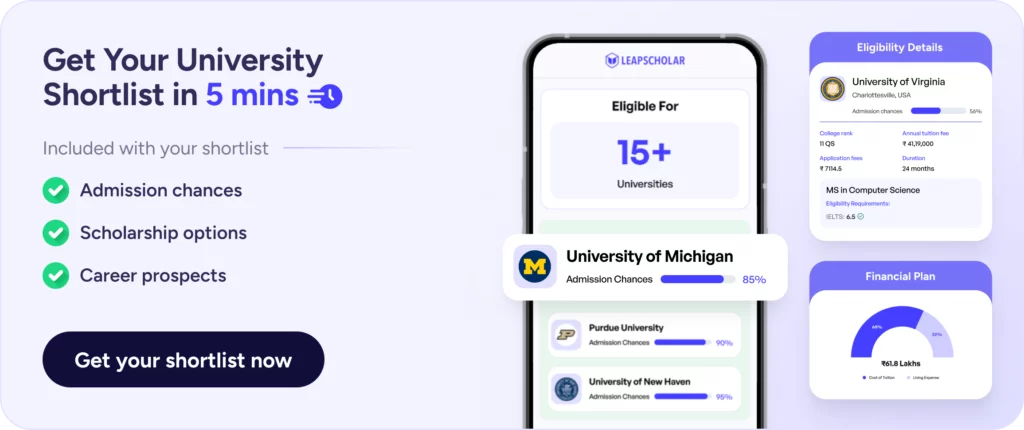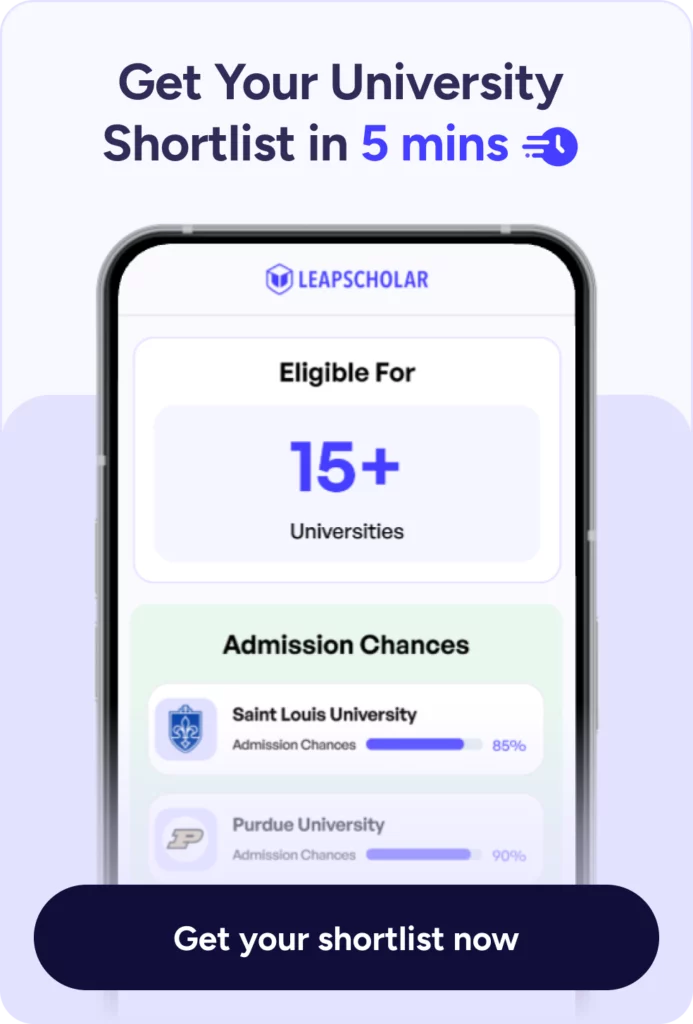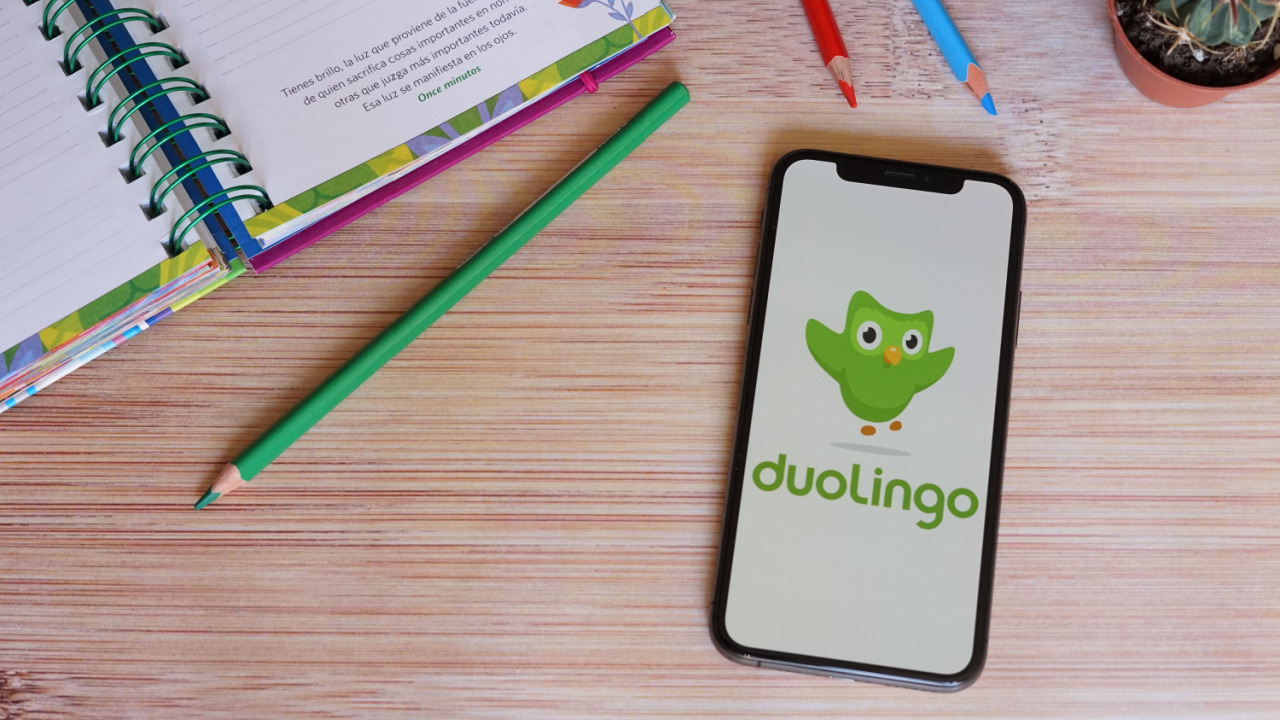The UK is known for its excellent education. Schooling in London is considered highly ranked because of the world rankings, where it ranks at four out of the Top 10 universities and four universities in the Global Top 50. It is the oldest destination that Indian students prefer.
Table of Contents

Which country do you want to study in?
Do you have a valid passport?
When do you want to study abroad?
What's your preferred program?
What's your highest level of education?
What is your IELTS/PTE/Duolingo Status?
How Leap will help you
Personalised University Shortlist
Express Applications with Quicker Admits
End-to-End Application Support
Along with schooling in London, you can work part-time while studying to help pay for some educational expenses. 25 out of the top 200 business schools worldwide are located in the UK, according to research in the QS Global MBA Rankings for 2023.
Scope of Schooling in London for Indian Students
More than 100 institutions in the UK provide a range of degree programmes for students from both within and outside the country. Roughly one-third of all students in the UK continue their education beyond high school, with the percentage significantly higher for students from Scotland. Due to this, there is intense competition to enroll in public schools, thus it is best to apply as soon as possible.
The majority of undergraduate degree programmes in the UK require three years to complete. But the increasingly popular "sandwich course" offers a four-year programme with a year of work experience (usually during your third year). Selecting the best school is influenced by several factors, including:
- Where the school is located—Is it an international or state school?
- How much does attending the school cost to study?
- What is the school's size?
- Access to the house based on distance
- Which courses are offered?
How does the Education system work in London
The education system in London schools is organised into four categories: elementary education, secondary education, further education, and higher education.
| Key Stages | Age group |
| Key Stage 1 | Ages 5 - 7 |
| Key Stage 2 | Ages 7 - 11 |
| Key Stage 3 | Ages 11 - 14 |
| Key Stage 4 | Ages 14 - 16 |
Students must begin primary school at the age of five to legally attend secondary education and primary school in Central London and other major parts of the city.
Types of Schools in London
In London, there are two primary categories of educational establishments: public state schools and private independent schools.
| Types of Schools | State Schools | Private Schools |
| About | State schools are free to attend and are supported by public funds. There are further categories of state schools in London, including academies, foundation schools, community schools, and voluntary-aided schools. Community schools adhere to the national curriculum and are managed by the local council. A governing body oversees foundation schools, which are taught according to the national curriculum. | Private schools are not government-funded and require tuition fees to attend. They serve students in grades 4 through 11, senior schools serve students in grades 11 through 16, and sixth-form colleges serve students in grades 16 through 18. Compared to public schools, private schools have greater autonomy in determining their curriculum and methodology. |
| Advantages | 1. Free Education 2. Standard Curriculum 3. No additional School Fees | 1. Cultural Diversity 2. All-rounded curriculum 3. Highly Qualified Teachers |
| Disadvantages | 1. Inconsistency 2. Lack of Choice 3. Catchment Issues | 1. Tuition fees 2. Location 3. Limited Access |
The GCSE Programme in London
A one- or two-year programme called GCSE (General Certificate of Secondary Education) leads to the A level of the University Foundation, which is also referred to as the International Baccalaureate. GCSEs, offer a superior secondary education foundation that helps you choose the best study path to a UK university. Indian students are the target audience for the CATS College GCSE programme.
The course is instructed by subject matter experts who have received training in teaching English as a second language to students. This course will enable you to discover your areas of interest and help you to fully realise your academic potential. Following your successful completion of the course, you will:
- Qualifications in several areas at the GCSE level
- Improve your topic knowledge as well as your English fluency and proficiency, which will serve as a pass to your desired university preparatory plan.
- Acquire the competencies necessary to succeed in the university readiness programme of your choice
- Develop fundamental life skills including teamwork, time management, and more.
Explore all countries
Pre-programme in London
The pre-programme course is one year or less in length and uses a GCSE approach. Depending on their progress, students may be eligible to sit for certain GCSE exams. Preparing students for the A level or International Baccalaureate (IB) is the program's main goal.
Your goal in this programme is to equip you with the fundamental knowledge and abilities needed to begin your university preparation programme, which is an A-level International Baccalaureate Diploma or University Foundation Programme. Following completion, you will be capable of:
- Have enhanced subject knowledge that is entry-level for your selected university preparatory programme.
- To assist you in attaining the intended academic achievement, you should have both proficiency and fluency (the ability to communicate) in English.
- Gain the competencies needed to succeed in your university preparation and be granted admission to a later degree programme.
- Learn life skills, like time management, confidence, teamwork, and more, that will benefit you in all aspects of your life.
Selecting your GCSE subjects is important because sixth forms seek out students who have achieved high marks in the subjects they have selected. Aside from this, if you are truly engaged in achieving your final objective, you will be able to achieve high grades in your GCSEs if you enjoy the topics you have chosen.
Wrapping Up
Primary, secondary, further, and higher education are the four divisions of the London school system's educational offerings. If you wish to study in London, United Kingdom, you should know that one of the most popular educational destinations is the city of London. Due to the UK's excellent educational system, a growing number of overseas students are wishing to apply for higher study here.
If you are ready to take the first step, further guidance to go for schooling in London is just a click away on LeapScholar.
Frequently Asked Questions (FAQs)
Q. What is higher education in the United Kingdom?
Ans. Higher education in the UK is the 3rd level of education when you complete school. It basically means education at universities and colleges for further education — this generally includes undergraduate and postgraduate studies.
Q. Is the UK good for international students?
Ans. The UK is the 2nd most popular centre, where a huge number of students (especially international students) want to opt for higher education. There are a variety of financial benefits for international students to attain their education outside their own country.
Q. Why London is best for education?
Ans. World-class research in science, health, and other fields is conducted in London, which is renowned as a global hub for academic achievement. Universities in London have contributed significantly to scientific and medical advancements by discovering things like DNA, penicillin, and fingerprints.
Q. Is it better to study in London or outside London?
Ans. For students, studying outside of London can be more affordable. The cost of lodging, transit, and utilities is typically less in areas elsewhere than the capital. Students occasionally may be able to purchase cars because regional cities provide such an affordable lifestyle.
Q. Why living outside of London is better?
Ans. Living in London is among the most costly in the whole of the United Kingdom. In order to make your monthly budget go farther, it will be worthwhile to expand your horizons.
Q. How can I apply to a school in London?
Ans. The local council's application procedure can be used to apply to schools in London. Applying for schools in a different council area or if you are a new immigrant to England, you still need to go through your local council. Either a primary or secondary school spot is up for grabs.
Q. What is the difference between state schools and private schools?
Ans. In the UK, state schools are subsidised by the government and are free to attend. Private schools are controlled by the owners and are generally more selective than private schools, which are governed by a board of governors or trustees.
Q. What are GCSE in London?
Ans. The General Certificate of Secondary Education, or GCSEs, are academic credentials that are subject-based. In the UK, secondary school students spend two years studying for GCSEs, typically in Years 10 and 11. They are evaluated using a battery of tests.
Q. How many GCSEs do you need to pass?
Ans. A minimum of five GCSEs, including English and Maths at grade 4 (C) or above, are typically required by colleges. These prerequisites, however, will change based on the school or course for which you are applying.
Q. Is education in London free?
Ans. There is no cost associated with the education. The parent's or child's immigrant status has no bearing on primary or secondary schooling. Even if you are undocumented or have an immigration status with the "no recourse to public funds (NRPF)" condition, your child can attend school.
Q. What is year 13 in the UK?
Ans. Year 13 is the year after Reception at schools in England and Wales. This year marks the end of Key Stage 5 in England, and as of 2015, pupils who completed Year 11 in an English educational institution are required to take part in some kind of training or study during this year.
Q. What is the education system like in London?
Ans. The majority of London boroughs provide 16 to 19-year-olds with an 11–18 comprehensive system; these boroughs almost invariably have comprehensive schools with a sixth form connected, as well as a FE college with roughly half of the young pupils in each.
















Have Questions? Get Guidance to reach your Dream University
Connect with India's finest counsellors and biggest study abroad community.
Get Guidance